初一英语下册U1-U3重点
七年级下册英语m1u3知识点

七年级下册英语m1u3知识点本文将针对七年级下册英语M1U3的知识点进行详细讲解,帮助学生更好地掌握该单元内容,提升英语学习水平。
一、语法知识1. 现在进行时现在进行时用于表示正在进行的动作,常用的结构是“主语+be 动词(am、is、are)+动词-ing”,例如:- They are playing soccer.- She is studying English.2. 一般现在时一般现在时用于表示现在经常做的动作或客观事实,常用的结构是“主语+动词原形”,例如:- He speaks Chinese fluently.- They go to school by bus.3. 物主代词物主代词用于代替名词所表达的所有权或归属关系,常用的物主代词有my、your、his、her、its、our、their,例如:- This is my pencil.- His sister is very kind.二、词汇知识1. 动词和名词动词是表示动作或状态的词语,例如:run、jump、sing、play 等。
名词是表示事物名称的词语,例如:book、desk、pen、teacher等。
2. 数词和形容词数词用来表示数量,常用的数词有one、two、three等。
形容词用于描述名词的性质或特征,例如:big、small、tall、short等。
3. 颜色和时间颜色用于描述物品的颜色,常用的颜色有red、blue、green等。
时间用于描述时刻或时间长度,常用的时间有hour、minute、second等。
三、阅读技巧1. 理解主旨理解主旨是阅读的基础技能,需要通过概括文章内容,判断文章大意,把握文章中心思想。
2. 掌握关键词掌握关键词是有效阅读的关键,需要通过抓住文章中的重点词汇,提炼文章核心内容,帮助理解文章。
3. 归纳总结归纳总结是提高阅读能力的重要手段,需要通过总结文章中的信息,梳理文章思路,形成自己的观点和思考。
七下英语 Unit1-3 考点全面总结(必背典句+短语归纳+话题写作)

七下英语 Unit1-3 考点全面总结(必背典句+短语归纳+话题写作)典句必背1. Can you draw? Yes, I can. / No, I cant.2. What club do you want to join? I want to join the chess club.3. You can join the English club.4. Sounds good./That sounds good.5. I can speak English and I can also play soccer.6. Please call Mrs. Miller at 555-3721.◆短语归纳1. play chess 下国际象棋2. play the guitar 弹吉他3.speak English 说英语4. English club 英语俱乐部5. talk to 跟说6. play the violin 拉小提琴7. play the piano 弹钢琴8. play the drums 敲鼓9. make friends 结交朋友10. do kung fu 练 (中国) 功夫11. tell stories 讲故事12. play games 做游戏13. on the weekend/on weekends 在周末◆话题写作Dear Sir,I want to join your organization (组织) to help kids with sports, music and English. My name is Mike. I am 15 years old. Im a student in No. 1 Middle school. I can play the guitar well. I can sing many songs. I can swim and speak English well, too.I think I can be good with the kids. I also do well in telling stories.I hope to get your letter soon.Yours,Mike◆典句必背1. What time do you usually get up? I usually get up at six thirty.2. Thats a funny time for breakfast.3. When do students usually eat dinner? They usually eat dinner at a quarter to seven in the evening.4. In the evening, I either watch TV or play computer games.5. At twelve, she eats lots of fruit and vegetables for lunch..6. She knows its not good for her, but it tastes good.7. Here are your clothes.◆短语归纳1. what time 几点2. go to school 去上学3. get up 起床4. take a shower 洗淋浴5. brush teeth 刷牙6. get to 到达7. do homework 做家庭作业8. go to work 去上班9. go home 回家10. eat breakfast 吃早饭11. get dressed 穿上衣服12. get home 到家13. eitheror 要么要么14. go to bed 上床睡觉15. in the morning/ afternoon/ evening 在上午/下午/晚上16. take a walk 散步17. lots of=a lot of 许多,大量18. radio station 广播电台19. at night 在晚上20. be late for=arrive late for 迟到◆话题写作主题:谈论日常作息习惯My School DayI am a student. I usually get up at seven, and I eat breakfast at seven thirty. Then I go to school at eight. School starts at eight thirty. I eat lunch at twelve. I go home at 17:00. I often eat dinner at 19:00 and then play the piano. I do my homework at 20:00. At 22:00, I go to bed.◆典句必背1. How do you get to school? I ride my bike.2. How far is it from your home to school?3. How long does it take you to get to school?4. For many students, it is easy to get to school.5. There is a very big river between their school and the village.◆短语归纳1. get to school 到达学校2. take the subway 乘地铁3. ride a bike 骑自行车4. how far 多远5. from home to school 从家到学校6. every day 每天7. take the bus 乘公共汽车8. by bike 骑自行车9. bus stop 公共汽车站10. think of 认为11. between and 在和之间12. one 11-year-old boy 一个11岁的男孩13. play with 和玩14. come true 实现15. have to 不得不◆话题写作主题:上学的交通方式写作思路:开篇点题:点出自己的出行方式;具体内容:自己选择这种交通方式的原因;结束语: 表明自己的观点。
初一下 一到三单元知识点汇总
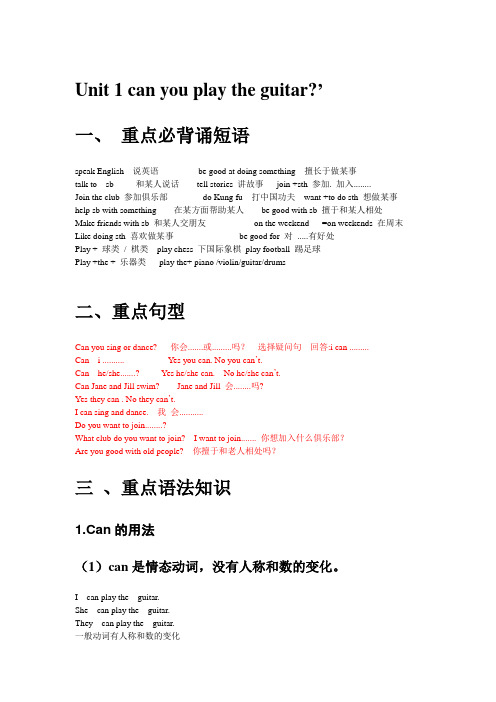
Unit 1 can you play the guitar?’一、重点必背诵短语speak English 说英语be good at doing something 擅长于做某事talk to sb 和某人说话tell stories 讲故事join +sth 参加. 加入........Join the club 参加俱乐部do Kung fu 打中国功夫want +to do sth 想做某事help sb with something 在某方面帮助某人be good with sb 擅于和某人相处Make friends with sb 和某人交朋友on the weekend =on weekends 在周末Like doing sth 喜欢做某事be good for 对.....有好处Play + 球类/ 棋类play chess 下国际象棋play football 踢足球Play +the + 乐器类play the+ piano /violin/guitar/drums二、重点句型Can you sing or dance? 你会.......或.........吗?选择疑问句回答:i can .........Can i .......... Yes you can. No you can’t.Can he/she.......? Yes he/she can. No he/she can’t.Can Jane and Jill swim? Jane and Jill 会........吗?Yes they can . No they can’t.I can sing and dance. 我会...........Do you want to join........?What club do you want to join? I want to join....... 你想加入什么俱乐部?Are you good with old people? 你擅于和老人相处吗?三、重点语法知识1.Can的用法(1)can是情态动词,没有人称和数的变化。
七年级下册英语U1T3知识点

七年级下册英语U1T3知识点七年级下册英语U1T3是一个重要的学习阶段。
本篇文章主要介绍该阶段的知识点,分为以下几个方面。
1. 人称代词人称代词包括主格和宾格,主格用于代替主语,宾格用于代替宾语。
如:I(我)/ me(我)、you(你)/ you(你)、he(他)/ him(他)等。
2. 句型转换在学习英语语法时,我们需要经常进行句型转换。
例如,将陈述句转换为疑问句,需要在句首加上助动词,将动词放在主语前面。
如:She is a teacher.(陈述句)→ Is she a teacher?(疑问句)3. 常用动词在英语中,常用动词有很多。
例如:do(做)、go(去)、come(来)、eat(吃)、drink(喝)、see(看)、write(写)、read(读)、listen(听)、speak(说)等。
学生们需要牢记这些动词的基本用法。
4. 做状语的副词和短语在英语语法中,副词和短语往往用来做状语。
例如:often(经常)、usually(通常)、sometimes(有时)、always(总是)、in the morning(在早上)、on weekends(在周末)等。
学生们需要掌握这些常用副词和短语。
5. 一般现在时一般现在时是英语中最基本的时态之一。
它表示现在一个动作的状态或习惯。
例如:I go to school every day.(我每天都去上学。
)在学习这个时态时,我们需要掌握动词的变化规则。
6. 一般过去时在英语中,一般过去时表示过去的某个时间里发生或存在的事情。
例如:I came to this city last week.(我上周来到这个城市。
)学生们需要学习动词在过去时的变化规则。
7. 语态英语中有两种语态——主动语态和被动语态。
主动语态是指句子的主语执行动作,而被动语态则是指句子的主语接受动作。
例如:She reads books every day.(主动语态)→ Books are read by her every day.(被动语态)学生们需要学习这两种语态的用法和变化规则。
【知识】新目标英语七年级下册Unit1-3重难点知识点【精华】
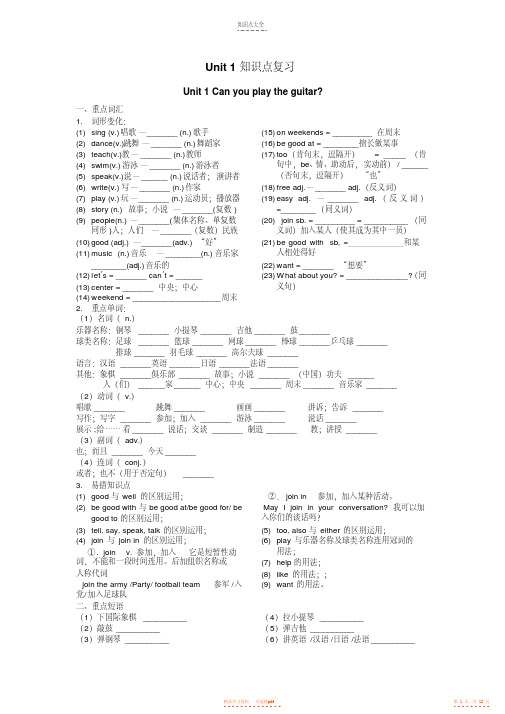
知识点大全Unit 1知识点复习Unit 1 Can you play the guitar?一、重点词汇1.词形变化:(1)sing (v.)唱歌—_______ (n.)歌手(2)dance(v.)跳舞—_______ (n.)舞蹈家(3)teach(v.)教—_______ (n.)教师(4)swim(v.)游泳—_______ (n.)游泳者(5)speak(v.)说—______ (n.)说话者;演讲者(6)write(v.)写—_______ (n.)作家(7)play (v.)玩—_______ (n.)运动员;播放器(8)story (n.) 故事;小说—_______(复数)(9)people(n.) —_______(集体名称、单复数同形)人;人们—_______(复数)民族(10)good (adj.) —_______(adv.) “好”(11)music (n.)音乐—________(n.)音乐家________(adj.)音乐的(12)let’s = _______ can’t = ______(13)center = _______ 中央;中心(14)weekend = ____________________周末(15)on weekends = _________ 在周末(16)be good at = ________擅长做某事(17)too(肯句末,逗隔开)= _____ (肯句中,be、情、助动后,实动前)/ ______(否句末,逗隔开)“也”(18)free adj.—_______ adj.(反义词)(19)easy adj. —_______ adj.(反义词)=________(同义词)(20)join sb. = _________ = __________(同义词)加入某人(使其成为其中一员)(21)be good with sb, =_______和某人相处得好(22)want = _______ “想要”(23)W hat about you? = ______________?(同义句)2.重点单词:(1)名词(n.)乐器名称:钢琴_______ 小提琴_______ 吉他_______ 鼓_______球类名称:足球_______ 篮球_______ 网球_______ 棒球_______乒乓球_______ 排球_______ 羽毛球_______ 高尔夫球_______语言:汉语_______英语_______日语_______法语_______其他:象棋_______俱乐部_______ 故事;小说_______ (中国)功夫______ 人(们)______家______ 中心;中央_______ 周末_______ 音乐家_______ (2)动词(v.)唱歌_______ 跳舞_______ 画画_______ 讲诉;告诉_______写作;写字_______ 参加;加入_______ 游泳_______ 说话_______展示;给……看_______ 说话;交谈_______ 制造_______ 教;讲授_______ (3)副词(adv.)也;而且_______ 今天_______(4)连词(conj.)或者;也不(用于否定句)_______3.易错知识点(1)good与well的区别运用;(2)be good with与be good at/be good for/ begood to的区别运用;(3)tell, say, speak, talk的区别运用;(4)join与join in的区别运用;①. join v. 参加,加入它是短暂性动词,不能和一段时间连用。
初一下U1-U3重点总结
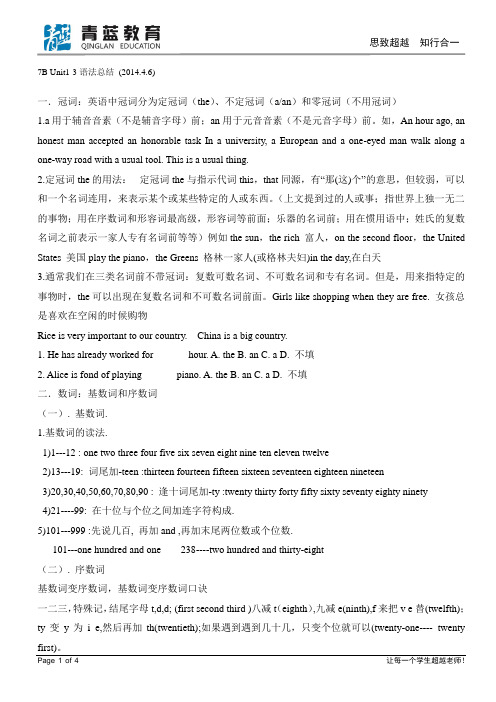
7B Unit1-3语法总结(2014.4.6)一.冠词:英语中冠词分为定冠词(the)、不定冠词(a/an)和零冠词(不用冠词)1.a用于辅音音素(不是辅音字母)前;an用于元音音素(不是元音字母)前。
如,An hour ago, an honest man accepted an honorable task In a university, a European and a one-eyed man walk along a one-way road with a usual tool. This is a usual thing.2.定冠词the的用法: 定冠词the与指示代词this,that同源,有“那(这)个”的意思,但较弱,可以和一个名词连用,来表示某个或某些特定的人或东西。
(上文提到过的人或事;指世界上独一无二的事物;用在序数词和形容词最高级,形容词等前面;乐器的名词前;用在惯用语中;姓氏的复数名词之前表示一家人专有名词前等等)例如the sun,the rich 富人,on the second floor,the United States 美国play the piano,the Greens 格林一家人(或格林夫妇)in the day,在白天3.通常我们在三类名词前不带冠词:复数可数名词、不可数名词和专有名词。
但是,用来指特定的事物时,the可以出现在复数名词和不可数名词前面。
Girls like shopping when they are free. 女孩总是喜欢在空闲的时候购物Rice is very important to our country. China is a big country.1. He has already worked for ______ hour. A. the B. an C. a D. 不填2. Alice is fond of playing ______ piano. A. the B. an C. a D. 不填二.数词:基数词和序数词(一). 基数词.1.基数词的读法.1)1---12 : one two three four five six seven eight nine ten eleven twelve2)13---19: 词尾加-teen :thirteen fourteen fifteen sixteen seventeen eighteen nineteen3)20,30,40,50,60,70,80,90 : 逢十词尾加-ty :twenty thirty forty fifty sixty seventy eighty ninety4)21----99: 在十位与个位之间加连字符构成.5)101---999 :先说几百, 再加and ,再加末尾两位数或个位数.101---one hundred and one 238----two hundred and thirty-eight(二). 序数词基数词变序数词,基数词变序数词口诀一二三,特殊记,结尾字母t,d,d; (first second third )八减t(eighth),九减e(ninth),f来把v e替(twelfth);ty变y为i e,然后再加th(twentieth);如果遇到遇到几十几,只变个位就可以(twenty-one---- twenty first)。
七年级英语下各单元知识点
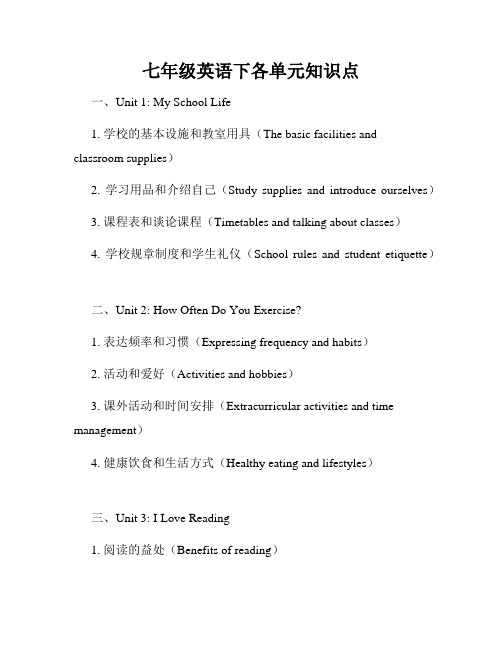
七年级英语下各单元知识点一、Unit 1: My School Life1. 学校的基本设施和教室用具(The basic facilities and classroom supplies)2. 学习用品和介绍自己(Study supplies and introduce ourselves)3. 课程表和谈论课程(Timetables and talking about classes)4. 学校规章制度和学生礼仪(School rules and student etiquette)二、Unit 2: How Often Do You Exercise?1. 表达频率和习惯(Expressing frequency and habits)2. 活动和爱好(Activities and hobbies)3. 课外活动和时间安排(Extracurricular activities and time management)4. 健康饮食和生活方式(Healthy eating and lifestyles)三、Unit 3: I Love Reading1. 阅读的益处(Benefits of reading)2. 图书馆和借书(Library and borrowing books)3. 阅读材料和阅读技巧(Reading materials and reading skills)4. 书评和阅读活动(Book reviews and reading activities)四、Unit 4: Our World1. 国家和国家文化(Countries and national cultures)2. 语言和交流(Language and communication)3. 地理和景点(Geography and landmarks)4. 国际节日和文化庆典(International festivals and cultural celebrations)五、Unit 5: Travel Time1. 旅游的准备(Preparation for travel)2. 交通工具和路线(Transportation and routes)3. 旅游目的地和景点(Tourist destinations and attractions)4. 旅游的个人体验和旅游业的作用(Personal experiences of travel and the role of tourism)六、Unit 6: Protecting Our Environment1. 环境保护的意义和挑战(Significance and challenges of environmental protection)2. 环境问题和解决方案(Environmental problems and solutions)3. 探索自然和地球保护(Exploring nature and protecting the earth)4. 个人责任和环保行动(Individual responsibility and environmental actions)七、Unit 7: Food and Drink1. 不同国家的饮食文化(Cuisine and food culture in different countries)2. 饮食文化和健康(Dietary culture and health)3. 食品安全和保护(Food safety and protection)4. 饮食决策和个人选择(Diet decisions and personal choices)八、Unit 8: Fashion and Shopping1. 时尚和服装文化(Fashion and clothing culture)2. 购物场所和购物习惯(Shopping places and shopping habits)3. 购物节和消费习惯(Shopping festivals and consumption habits)4. 消费观和可持续消费(Consumerism and sustainable consumption)九、Unit 9: Jobs and Work1. 工作选择和职业规划(Career choices and career planning)2. 工作场所和工作时间(Workplace and work schedules)3. 工作技能和职业发展(Work skills and professional development)4. 工作文化和课题解决(Work culture and problem solving)十、Unit 10: Health and Fitness1. 健康生活方式和身体检查(Healthy lifestyles and physical checkups)2. 心理健康和社交能力(Mental health and social skills)3. 健身和运动习惯(Fitness and exercise habits)4. 疾病预防和健康教育(Disease prevention and health education)综上所述,七年级英语下各单元的知识点紧密结合日常生活,让学生在学习中更加了解和熟悉英语在现实生活中的应用,同时也丰富了学生的语言技能,提高了其语言表达和交流能力。
人教版七年级下册 Units 1-3重点短语、句型、语法小结
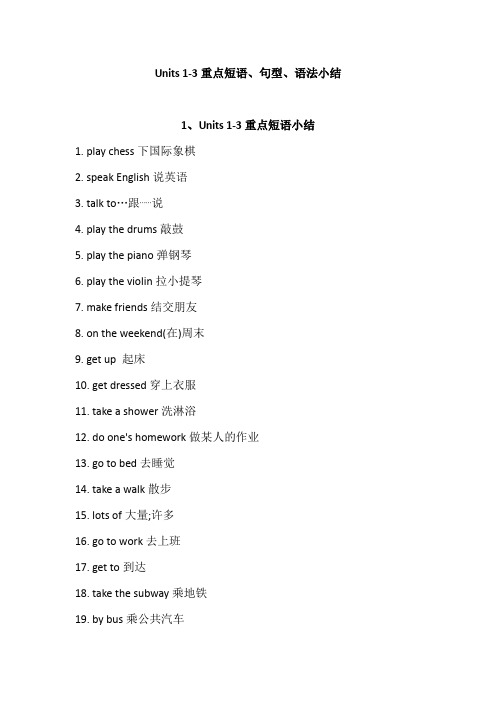
Units 1-3重点短语、句型、语法小结1、Units 1-3重点短语小结1. play chess下国际象棋2. speak English说英语3. talk to…跟⋯⋯说4. play the drums敲鼓5. play the piano弹钢琴6. play the violin拉小提琴7. make friends结交朋友8. on the weekend(在)周末9. get up 起床10. get dressed穿上衣服11. take a shower洗淋浴12. do one's homework做某人的作业13. go to bed去睡觉14. take a walk散步15. lots of大量;许多16. go to work去上班17. get to到达18. take the subway乘地铁19. by bus乘公共汽车20. think of认为21. come true实现;成为现实2、Units 1-3重点句型小结1. be good at...擅长于⋯⋯2. help sb with sth在某方面帮助某人3. be good with…善于;对······有办法4. What can you do?你能做什么?5. What club do you want to join?你想加入什么俱乐部?6. be late for……迟到7. What time/When do you...你几点/什么时候……8. How do you get to school?你怎么到学校?9. How long does it take to…?……花费多长时间?10. How far is it from... to...?从······到······多远?11. either…or…要么⋯⋯要么⋯⋯;或者⋯⋯或者……12. It is easy to………是容易的13. between…and…在……和……之间3、Units 1-3重点语法小结1.情态动词can的用法can可表示能力,意为“能;会”;还可表示请求或允许,意为“可以”;还可表示猜测,意为“可能”。
人教版英语七年级英语下册Unit 1 ---3知识点 汇总期中复习

“1.情态动词+V 原人教版七下英语(1)Unit 1 Can you play the guitar?2.play+棋牌类/球类名词;play+the+乐器名词3.join the+…club加入…社团4.4 个说的区别: say+内容;talk to/with; speak+语言; tell sb. sth/ tell sb. to do/ tell sb not to do5.want= would like +(sb)to do sth6.4 个也的区别: too 肯定句句末(前面加逗号);either 否定句句末(前面加逗号);also 实前 be 后;as well 口语中(前面不加逗号)7.b e good at+ V-ing=do well in 擅长于be good for 对…有益(be bad for 对…有害)be good to 对…友好(good 可用 friendly/nice/kind 替换)be good with 和…相处地好=get on/ alongwell with 8.How/ What about+V-ing …怎么样?(表建议)9.感官动词(look, sound, taste, smell, feel)+adj./ like10.sb. wanted for(wanted 表示招募,含有被动意义)11.show sth to sb=show sb sth 向某人展示give sth to sb=give sb sth 把某物给某人12.help sb (to) do sth = help sb with sth 帮助某人做某事with sb’s help= with the help of sb在某人的帮助下help oneself to 随便吃…13.be busy doing sth./ be busy with sth. 忙于做某事14.need (sb) to do sth 需要做某事;need sth15.be free= have time to do sth. 有时间做某事16.have friends= make friends 交朋友17.call sb at +电话号码18.on the weekend= on weekends 在周末19.English-speaking students 说英语的学生SectionAUnit 1 Can you play the guitar?I.根据句意及首字母提示完成单词1.—What club do you want to j ?—English club.2.—Can you s Chinese?—Yes, but a little.3.—Can you s in the river?—Yes, I can.4.Most people like Jay Chou. He can s well.5.Please s me your new storybook. I want to buy one, too. II.用括号中所给词的适当形式填空6.I don’t want7.Michelle wants tojoin the (join) the English club.(swim) club.8.Wang Qiang (speak) English very well.9.He can (go) to the movies on weekends.10.She is a writer. She (write) stories for children.III.单项选择( ) 11. —club do you want to join?—Music club.A. WhatB. WhereC. WhoD.Why ( ) 12. —Can you play baseball?—Sorry, I .A. don’tB. doC. can’tD.can ( ) 13. Can you English?A. sayB. talkC. speakD.tell ( ) 14. —What aboutto our English teacher?—Sounds good.A. talkB. to talkC. talkingD. talked ( ) 15. Hurry up, you will miss the plane.A. andB. butC. soD. orIV.对划线部分提问(每空一词)16. Han Mei wants to join the art club.Han Mei to join?I.根据句意及首字母提示完成单词1.I can play the guitar, but I can’t play the (钢琴).2.I don’t like eggs o apples.3.Look, he is playing the (鼓).4.Do you have a (小提琴)?5.Mr. Lin t us English well.II.单项选择( ) 6. Xiao Gang often his mother the housework.A. helps; toB. help; toC. helps; withD. help; with ( ) 7. Are you goodstudents?A. atB. forC. ofD. with( ) 8. Tom is a student. I am a student.A. alsoB. tooC. eitherD.to ( ) 9. Please call 0668-0432.A. her inB. her atC. hers atD. shein ( ) 10. Do you like soccer us this Sunday?A. to play; forB. to play; withC. play; forD. play; withIII.根据汉语意思,完成英语句子(每空一词)11.她教我们历史。
七年级下册英语unit1 3知识点总结
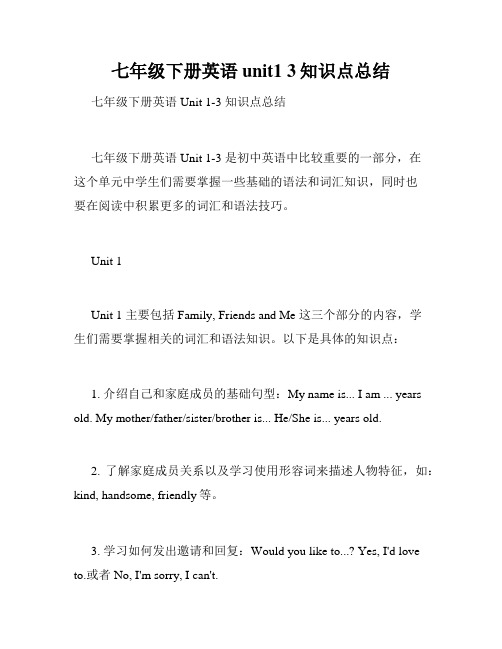
七年级下册英语unit1 3知识点总结七年级下册英语Unit 1-3 知识点总结七年级下册英语Unit 1-3 是初中英语中比较重要的一部分,在这个单元中学生们需要掌握一些基础的语法和词汇知识,同时也要在阅读中积累更多的词汇和语法技巧。
Unit 1Unit 1 主要包括 Family, Friends and Me 这三个部分的内容,学生们需要掌握相关的词汇和语法知识。
以下是具体的知识点:1. 介绍自己和家庭成员的基础句型:My name is... I am ... years old. My mother/father/sister/brother is... He/She is... years old.2. 了解家庭成员关系以及学习使用形容词来描述人物特征,如:kind, handsome, friendly等。
3. 学习如何发出邀请和回复:Would you like to...? Yes, I'd love to.或者 No, I'm sorry, I can't.4. 了解并运用表示年龄、职业、爱好等的英文词汇。
5. 学习关于家庭聚会的词汇,如:food, drinks, games等。
Unit 2Unit 2 的主要内容是学生们需要掌握动词的适当时态和形式,同时加强对英文的听力和口语能力。
以下是具体的知识点:1. 学习动词的时态和形式:现在时、过去时、将来时,以及不规则动词的过去式。
同时进行语句的变换练习。
2. 掌握含时间状语从句的句子结构及用法。
3. 学习如何描述旅行:如何预订机票、酒店,如何问路以及询问如何抵达目的地等相关词汇。
4. 学习寒假和暑假的词汇及表达方式。
5. 加强听力和口语训练,特别是学习如何用英文描写某个地方、描述周围环境等。
Unit 3Unit 3 的主要内容是学习词汇和语法知识。
学生们需要通过阅读和书写来掌握一些实用的英文表达方式。
以下是具体的知识点:1. 掌握名词、形容词和副词的相互转换,如:lively, quiet,noisy等。
人教版七年级英语下册第一到三单元知识点

人教版七年级英语下册第一到三单元知识点人教版七年级英语下册1-3单元知识点复习Unit 1.Can you play the guitar1. play + 球/棋/牌 play football /chess/ cardsPlay the +乐器 play the guitar play the pianoPlay with 和…一起玩 play with me his friends2. Speak ①说某种语言 Speak English/ Chinese②发言He doesn’t like speaking in class.他上课不喜欢发言。
English-speaking students 说英语的学生spoken English 英语口语3. want 需要,想要 = would likewant to do sth. 想要做某事 = would like to do sth.want sb. to do sth. 想要某人做某事 = would like sb to do sth4. join 参加,加入join sb 加入某人join (sb ) in sth 加入(某人)参加某项活动(如game,talk,discussion等) join a/ the ..... club 加入...俱乐部 join a sports club 加入运动俱乐部join +组织、团体 join the army 参军 join the party 入党5. let sb +动词原形让/允许某人做某事My parents don’t let me watch TV on school nights.Let’s + do sth. 让我们…吧! ( 包括说话对方在内)(表示建议的句型)Let’s go, shall we? 我们一起走,好吗?Let us go, will you? 让我们走,好吗?6. write stories 写故事 writer 名词作家write to sb. 给某人写信 write down 写下,记下7.tell a story , tell stories 讲故事tell sb. sth.= tell sth. to sb 告诉某人某事tell sb a story=tell a story to sb. 给某人讲故事tell sb. (not) to do sth. 告诉某人(不要)做某事8. show ①演出,节目on show 在展览TV show 电视节目school show②给…看,展示show sb. sth.= show sth. to sb. 给某人看某物Show me your photos.= Show your photos to me.9.help sb. with sth. 在某方面帮助某人Can you help me with my English?help sb. (to) do sth. 帮助某人做某事10.busy 忙碌的,忙的be busy (in) doing sth. 忙于做某事be busy with sth.忙于某事11. home 为副词 at home 在家 get home 到家 go home 回家12.free ①自由的 I want to be(成为) a free bird.②空闲的 I am free on the weekend.③免费的 They are working for free. 他们在无偿工作。
新目标七年级下册英语期末复习提纲unit 1-unit3(重点单词 短语 句型 语法)
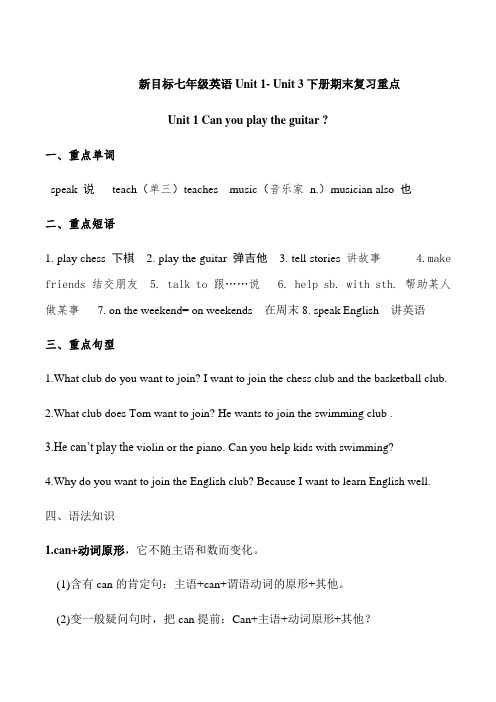
新目标七年级英语Unit 1- Unit 3下册期末复习重点Unit 1 Can you play the guitar ?一、重点单词speak 说teach(单三)teaches music(音乐家n.)musician also 也二、重点短语1.play chess 下棋2. play the guitar 弹吉他3. tell stories 讲故事4.make friends 结交朋友5. talk to 跟……说6. help sb. with sth. 帮助某人做某事7. on the weekend= on weekends 在周末8. speak English 讲英语三、重点句型1.What club do you want to join? I want to join the chess club and the basketball club.2.What club does Tom want to join? He wants to join the swimming club .3.He can‟t play the violin or the piano. Can you help kids with swimming?4.Why do you want to join the English club? Because I want to learn English well.四、语法知识1.can+动词原形,它不随主语和数而变化。
(1)含有can的肯定句:主语+can+谓语动词的原形+其他。
(2)变一般疑问句时,把can提前:Can+主语+动词原形+其他?肯定回答:Yes,主语+can。
否定回答:No,主语+can't.(3)含有can的否定句:主语+can't+动词的原形+其他。
(4)含有can的特殊疑问句:特殊疑问词+can+主语+动词原形+其他?2.may+动词的原形。
七下英语Unit1-3知识点大全
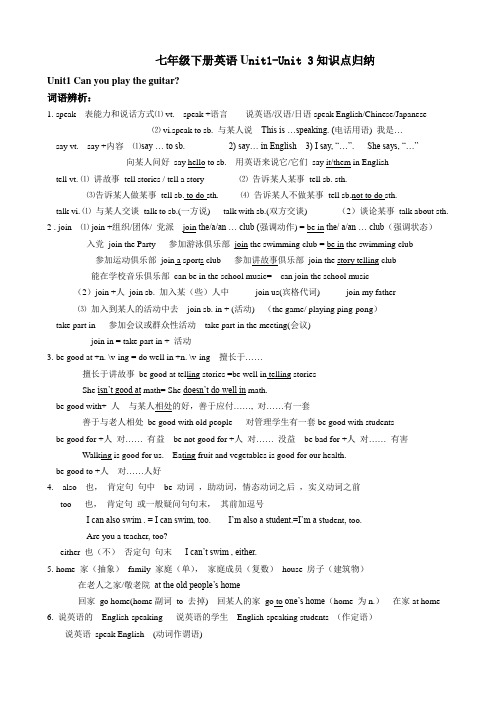
七年级下册英语U nit1-Unit 3知识点归纳Unit1 Can you play the guitar?词语辨析:1. speak 表能力和说话方式⑴ vt. speak +语言说英语/汉语/日语speak English/Chinese/Japanese⑵ vi.speak to sb. 与某人说This is …speaking. (电话用语) 我是…say vt. say +内容⑴say … to sb. 2) say… in English 3) I say, “…”. She says, “…”向某人问好say hello to sb. 用英语来说它/它们say it/them in Englishtell vt. ⑴讲故事tell stories / tell a story ⑵告诉某人某事tell sb. sth.⑶告诉某人做某事tell sb. to do sth. ⑷告诉某人不做某事tell sb.not to do sth.talk vi. ⑴与某人交谈talk to sb.(一方说) talk with sb.(双方交谈) (2)谈论某事talk about sth.2 . join ⑴ join +组织/团体/ 党派join the/a/an … club (强调动作) = be in the/ a/an … club(强调状态)入党join the Party 参加游泳俱乐部join the swimming club = be in the swimming club参加运动俱乐部join a sports club 参加讲故事俱乐部join the story telling club能在学校音乐俱乐部can be in the school music= can join the school music(2)join +人join sb. 加入某(些)人中join us(宾格代词) join my father⑶加入到某人的活动中去join sb. in + (活动) (the game/ playing ping-pong)take part in 参加会议或群众性活动take part in the meeting(会议)join in = take part in + 活动3. be good at +n. \v-ing = do well in +n. \v-ing 擅长于……擅长于讲故事be good at telling stories =be well in telling storiesShe isn’t good at math= She doesn’t do well in math.be good with+ 人与某人相处的好,善于应付……, 对……有一套善于与老人相处be good with old people 对管理学生有一套be good with studentsbe good for +人对…… 有益be not good for +人对…… 没益be bad for +人对…… 有害Walking is good for us. Eating fruit and vegetables is good for our health.be good to +人对……人好4. also 也,肯定句句中be 动词,助动词,情态动词之后,实义动词之前too 也,肯定句或一般疑问句句末,其前加逗号I can also swim . = I can swim, too. I’m also a student.=I’m a st udent, too.Are you a teacher, too?either 也(不)否定句句末I can’t swim , either.5. home 家(抽象)family 家庭(单),家庭成员(复数)house 房子(建筑物)在老人之家/敬老院at the old people’s home回家go home(home副词to 去掉) 回某人的家go to one’s home(home 为n.)在家at home 6. 说英语的English-speaking 说英语的学生English-speaking students (作定语)说英语speak English (动词作谓语)词汇的用法:1.play ⑴play the +乐器弹吉他/弹钢琴/拉小提琴/敲鼓play the guitar/ play the piano/ play the violin/play the drums⑵play + 棋/牌/球类下棋/打牌play chess/play cards踢足球/打篮球/打网球/打排球play soccer/ football/ play basketball/ play tennis/play volleyball⑶与某人玩play with sb. (宾代) 与人玩游戏play games with people玩某物play with sth. 玩水play with water做运动play sports=do/have sports= take exercise 玩电脑游戏play computer games2. sport 作定语常用复数 a sports club sports shoes/trousers/clothes指一项运动用单数Running is a good sport.3. want vt. ⑴ want +n.\to do 1) want sth. 2) want to do 3) want sb. (宾代) to do动词、介词后用宾格代词(me/us/you/you/it/ him/her/them)(2)want …for … 为…… 想要……⑶wanted “被需要的”常用在招聘或启示的标语中招聘教师teachers wanted (作后置定语)want students for school show= students wanted for school show 为学校演出招募学生4.show ⑴ n. 演出,节目,表演,展示学校演出the school show 电视节目TV show 脱口秀talk show 时装表演fashion show 在展览中be on show注意:表演中国功夫do Chinese kung fu⑵ v. 展示,给……看show sb. 给我们展示show us把某物拿给某人看show sb sth. =show sth. to sb. 当看的物为代词时,只能用show it/ them to sb.5. teach 三单teaches v. 教teacher n. 教师⑴ teach sb./sth. teach us/me teach math⑵ teach sb. sth. sb.为宾格代词教我们的英语teach us English⑶ teach sb. to do sth. 教他们游泳teach them to swim6. help v. 帮助⑴ help sb. ⑵ help with sth./v-ing ⑶ help sb. with sth.= help sb. (to) do sth.help me with math=help me learn math=help me to learn mathn. (不可数名词)帮助⑴ some/much help ⑵with one’s help = with the help of 在某人的帮助下⑶ ask sb. for help向某人寻求帮助注意:help yourself to … (some fish.) 随便吃……鱼7. need 实义动词三单needs 有人称和数的变化问句和否定句借助do/does 可单独作谓语⑴ need(s) sth. ⑵ need(s) to do ⑶ need(s) sb/sth. to do情态动词没有人称和数的变化(常用在问句和否定句中)问句need 提前否定句need +not =needn’t 不能单独作谓语need(原形) + v(原形)She need come. (一般)Need she come tomorrow? No, you needn’t8. write ⑴写小说write stories /write a story ⑵写信write a letter⑶给某人写信write to sb.=write a letter to sb.9. or 或者,还是⑴选择疑问句回答不用yes/no 从中选一个来回答or 前读↗,or 后读↘选择疑问句前半部分可以是一般疑问句,也可以是特殊疑问句。
七年级下册Unit 1—Unit 3重点知识复习
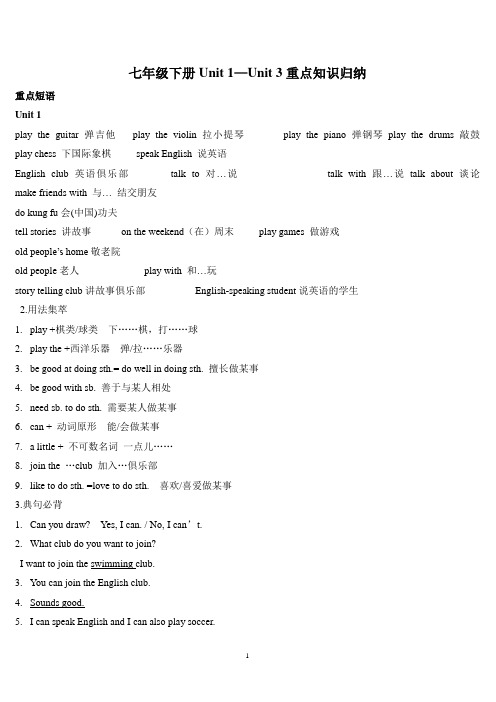
七年级下册Unit 1—Unit 3重点知识归纳重点短语Unit 1play the guitar 弹吉他play the violin 拉小提琴play the piano 弹钢琴play the drums 敲鼓play chess 下国际象棋speak English 说英语English club 英语俱乐部talk to 对…说talk with 跟…说talk about谈论make friends with 与…结交朋友do kung fu会(中国)功夫tell stories 讲故事on the weekend(在)周末play games 做游戏old people’s home敬老院old people老人play with 和…玩story telling club讲故事俱乐部English-speaking student说英语的学生2.用法集萃1.play +棋类/球类下……棋,打……球2.play the +西洋乐器弹/拉……乐器3.be good at doing sth.= do well in doing sth. 擅长做某事4.be good with sb. 善于与某人相处5.need sb. to do sth. 需要某人做某事6.can + 动词原形能/会做某事7. a little + 不可数名词一点儿……8.join the …club 加入…俱乐部9.like to do sth. =love to do sth. 喜欢/喜爱做某事3.典句必背1.Can you draw? Yes, I can. / No, I can’t.2.What club do you want to join?I want to join the swimming club.3.You can join the English club.4.Sounds good.5.I can speak English and I can also play soccer.6.Please call Mrs. Miller at 555-3721.一.短语荟萃1.speak English /Chinese 讲英语/ 讲汉语2 pay the guitar/the drums/the piano /violin 弹吉他3.play chess/soccer/volleyball 下棋,,踢足球4.join the swimming club 加入游泳俱乐部join the art club 加入艺术俱乐部join the chess club 加入象棋俱乐部join the music club 加入音乐俱乐部join a sports club 加入一个运动俱乐部join the story telling club加入讲故事俱乐部5.be good at doing sth. =do well in doing擅长干某事6.tell sb. stories= tell stories to sb. 给某人讲故事,write stories写故事7.talk to sb.与某人说话talk with sb. 与某人交谈talk about 谈论…..8.do Chinese Kung fu 表演中国功夫9.show sb.sth= show sth to sb. 给某人出示事某物10.help sb. with (doing )sth./ ,help sb. (to )do sth.. 帮助某人干某事11.be good with sb. 善待某人12.need sb to do sth. 需要某人干某事13.English-speaking country 讲英语的国家14.call sb. at….给某人打电话15.the Students’Sports Center 学生运动中心16.make friends with sb.与某人交朋友17. at the old people’s home 在老年之家18.be free 有空be busy 繁忙重点句型1、I can play soccer, and I can play the guitar.(play +棋类/球类“下…棋,打…球” play the +乐器“弹/拉…乐器”)2.You’re good at telling stories. Are you good with old people?(be good at sth/doing sth.= do well in sth/doing sth. 擅长做某事)(be good with sb/sth. 善于与某人相处/善于处理某事) (be good for对…有好处)3、Can y ou draw? Yes, I can. / No, I can’t. (can+ do sth / can’t + do sth)4、What club do you want to join? I want to join the chess club.(want sb to do sth想要某人做某事)5、You can join the English club.6、I can speak English and I can also play soccer.7、Are you busy after school?(be busy doing sth忙于做某事)8、We need you to help with sports for English-speaking students.(need sb to do sth需要某人做某事)(help sb to do sth;help sb with sth帮助某人做某事)9、Please call Mrs. Miller at 555-3721. (call sb at + 电话号码)10、I like to draw,too. (like to do sth; like doing sth喜欢做某事)Unit 2what time 几点go to school 去上学get up 起床take a shower 洗淋brush teeth 刷牙get dressed 穿上衣服eat breakfast 吃早饭eat lunch 吃中饭eat dinner 吃晚饭get to 到达go to work 去上班play sports做运动go home 回家do homework 做家庭作业get home 到家take a walk 散步go to bed 上床睡觉clean my room打扫房after that在那之后after school放学后best friend最好的朋友either…or… 要么…要么…(就近原则)lots of=a lot of 许多,大量radio station 广播电台be/arrive late for 迟到at night 在晚上watch TV看电healthy habits健康的习惯healthy life健康的生活after dinner晚饭后play computer games玩电脑游戏half an hour半小时make breakfast做早餐短语归纳1.what time 几点2.go to school 去上学3.get up 起床4.take a shower 洗淋浴5.brush teeth 刷牙6.get to 到达7.do homework 做家庭作业8.go to work 去上班9.go home 回家10.eat breakfast 吃早饭11.get dressed 穿上衣服12.get home 到家13.either…or…要么…要么…(就近原则)14.go to bed 上床睡觉15.take a walk 散步16.in the morning/ afternoon/ evening 在上午/下午/晚上17.lots of=a lot of 许多,大量18.radio station 广播电台19.at night 在晚上20.be/arrive late for 迟到用法集萃1.at + 具体时间点在几点(几分)2.eat breakfast/ lunch/dinner吃早饭/午饭/晚饭3.take a(n) +名词从事(……)活动4.half past +基数词……点半5. a quarter to +基数词差一刻到……点6.from …to …从……到……7.need to do sth 需要做某事典句必背1.What time do you usually get up?I usually get up at six thirty.They usually eat dinner at a quarter to seven in the evening.He usually get up at half past six in the morning.(at+具体时间点“在几点钟”)(at+时钟+分钟“在几点钟”)(half past+时钟(基数词) “…点半” ;a quarter to+时钟(基数词) “差一刻到…点” )(分钟+past+时钟(基数词) “…点过…分”;分钟+to+时钟(基数词) “…点差…分” )2、That’s a funny time for breakfast.3、When do students uasually eat dinner?4、In the evening, I either watch TV or play computer games. (either…or… )5、At twelve,she eats lots of fruit and vegetables for lunch.(lots of+ 可数名词复数/不可数名词“许多,大量…”)6、She knows it’s not good for her, but it tastes good. (be good for)7、Here are your clothes.佳作赏析主题:谈论日常作息习惯写作思路:按照时间顺序记叙一个人的日常作息习惯,必须注意时间的先后顺序,以及时间的表达方式,可以适当运用一些表示频率的副词。
七年级英语下册Unit1—3知识总结
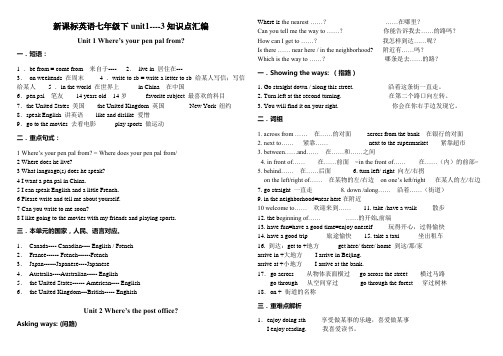
新课标英语七年级下unit1----3知识点汇编Unit 1 Where’s your pen pal from?一.短语:1 .be from = come from 来自于---- 2.live in 居住在---3.on weekends 在周末 4 .write to sb = write a letter to sb 给某人写信;写信给某人 5 .in the world 在世界上in China 在中国6.pen pal 笔友14 years old 14岁favorite subject 最喜欢的科目7.the United States 美国the United Kingdom 英国New York 纽约8.speak English 讲英语like and dislike 爱憎9.go to the movies 去看电影play sports 做运动二.重点句式:1 Where’s your pen pal from? = Where does your pen pal from/2 Where does he live?3 What language(s) does he speak?4 I want a pen pal in China.5 I can speak English and a little French.6 Please write and tell me about yourself.7 Can you write to me soon?8 I like going to the movies with my friends and playing sports.三.本单元的国家,人民、语言对应。
1.Canada---- Canadian---- English / French2.France------ French------French3.Japan------Japanese----Japanese4.Australia----Australian----- English5.the United States------ American---- English6.the United Kingdom---British----- EnghishUnit 2 Where’s the post office?Asking ways: (问路)Where is the nearest ……?……在哪里?Can you tell me the way to ……?你能告诉我去……的路吗?How can I get to ……?我怎样到达……呢?Is there …… near here / in the neighborhood? 附近有……吗?Which is the way to ……?哪条是去……的路?一.Showing the ways: (指路)1. Go straight down / along this street. 沿着这条街一直走。
- 1、下载文档前请自行甄别文档内容的完整性,平台不提供额外的编辑、内容补充、找答案等附加服务。
- 2、"仅部分预览"的文档,不可在线预览部分如存在完整性等问题,可反馈申请退款(可完整预览的文档不适用该条件!)。
- 3、如文档侵犯您的权益,请联系客服反馈,我们会尽快为您处理(人工客服工作时间:9:00-18:30)。
asleep 是形容词,意为“睡着的”,常用词组:be asleep“睡着的”; fall asleep“入睡”。另外,我们也学过了go to bed,这三个短语都可以表示“睡觉”,但它们的“睡法”不同,要注意区分:be asleep指睡着的状态;fall asleep强调入睡的瞬间动作;go to bed 指“上床睡觉”,强调去睡觉的动作,不涉及是否睡着。
U1
3. Lots of people take tuk-tuk to get through the traffic quickly. 许多人乘坐“突突车”在拥挤的交通中快速敏捷地穿行。
此句中get through意为“从……中间穿过”,注意这里不可用across代替through,through表示从某个空间“穿过”;across表示从某物表面的一点“横过”到另一点,例如: He walked across the hall. 他从大厅的一端走到另一端。He walked through the gate. 他穿过大门。
U3
人称代词的指代作用:人称代词不仅可以指人,也可以指物。人称代词的人称,数和性由其所指代的名词决定,人称代词的格由其在句子中的地位来决定。作为主语就用主格,做宾语用宾格。
注意:because / because of都表示“因为”。because 为连词, 引导原因状语从句;because of 为短语介词,后接名词或代词。
并列连词and ,but和so
连词是句子、短语或段落之间的桥梁. 它分为两类: 并列连词和从属连词. 并列连词用来连接两个或两个以上功能相等的成分,例如两个或两个以上的定语、状语等.
and ,but和so在文中的使用可以避免重复,提炼语句,承上启下, 给句子添加逻辑意义等.
2. and, but和so作为并列连词,都可以连接句子, 性; but 连接的内容,后句是前句意思的对照转折; so引导的句子, 是对前面内容的总结, 表示结果, 是因果关系.
2.join作“参加”解时,也可接 sth.,表示加入某组织成为其成员,如入团、入党加入俱乐部等;take part in也表示“参加”指参加群众性活动、会议、比赛、游行等,往往指参加者持有积极的态度,起一份作用。
注意:某些表示思想、感觉、所属或状态等,静态动词如believe, think, know, understand, love, like, see, hear, smell, taste, want, own 等,一般不用现在进行时。
4. Then, after dark, we put them carefully into the river and watch them sail away. 之后,天黑了,我们小心地把它们放进河里,并望着它们漂远。(P6)
此句中,watch sb. do sth.意为“看见某人做某事”,强调看见某个动作的全过程,省略动词不定式中的to。watch接除不带to的不定式外,还可接动词-ing形式,意为“看见某人正在做某事”,强调看见某个动作正在进行。同样用法的感官动词还有see, hear, listen to, look at等。
U2
重点:1. join的意思是“加入……一起”,只加sb作宾语,而我们前面学到的“Some trees can also join their roots together underground ...”中的join意思是“连接”,注意join本身含有“在一起”的意思,所以一般情况下不再与together连用,只是在表示“胶合一起”时才加together,如课文中join their roots together,而不说join us together。
